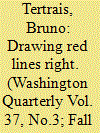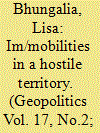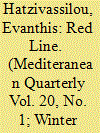| Srl | Item |
| 1 |
ID:
142988


|
|
|
|
|
| Summary/Abstract |
In the past two years, the expression “red line” has become a regular feature of the global policy debate. So much so that it risks becoming a punch line. Red lines have appeared in discussions about the Ukraine crisis, Iran's nuclear program, and Syrian use of chemical weapons. President Obama famously stated in 2012 that “a red line for us is we start seeing a whole bunch of chemical weapons moving around or being utilized.”
|
|
|
|
|
|
|
|
|
|
|
|
|
|
|
|
| 2 |
ID:
113516


|
|
|
|
|
| Publication |
2012.
|
| Summary/Abstract |
This article examines the biopolitical dimensions of conflict manifest in Israel's disengagement from the Gaza Strip. Exploring a managed relation between life and death largely unaddressed in Foucault's conception of biopower, it contends that Israel's "disengagement" can be seen as a more sophisticated, flexible form of engagement that does not disinvest in or abandon life, but actively regulates it. Close analysis of emerging tactics of population control in Gaza illustrate that neither a "pure" politics of life or death emerges; rather, a more complex management of the two is achieved through the modulation of crucial life-sustaining and life-eliminating flows into and out of the territory. This paper links biopolitical practices of mobility regulation to the ways in which life is enabled, constrained and denied for those in a territory designated as "hostile." Thus, it directly connects the biopolitical dimensions of conflict to territory and the geopolitical violences of territoriality.
|
|
|
|
|
|
|
|
|
|
|
|
|
|
|
|
| 3 |
ID:
087989


|
|
|
|
|
| Publication |
2009.
|
| Summary/Abstract |
India and Pakistan have now been nuclear powers for at least a decade, apparently already having "gone to the brink" several times. Despite the dire potentialities of nuclear exchange, both countries pursue very specific nuclear deterrent and response strategies. These strategies can be found in their doctrinal development, how they articulate that doctrine and affiliated "red lines," and deployment of nuclear weapons delivery means and associated systems (such as antiballistic missiles systems and satellites).
|
|
|
|
|
|
|
|
|
|
|
|
|
|
|
|
| 4 |
ID:
087848


|
|
|
|
|
| Publication |
2009.
|
| Summary/Abstract |
The negotiating position of an international player is strengthened when it can persuade third parties that it has reached the limits of its concessions. However, from 1945 to 2004 the Greek side (both Athens and Nicosia) managed convincingly to convey this message to the international community only twice: in 1958, prior to the conclusion of the agreements for Cypriot independence, and in 2004, when the Annan Plan was rejected by the Greek-Cypriot community. This failure of the Greek side should be attributed to a combination of maximalism, lack of accurate assessments of the interests and objectives of other actors, and lack of consistency in Greek discourse.
|
|
|
|
|
|
|
|
|
|
|
|
|
|
|
|